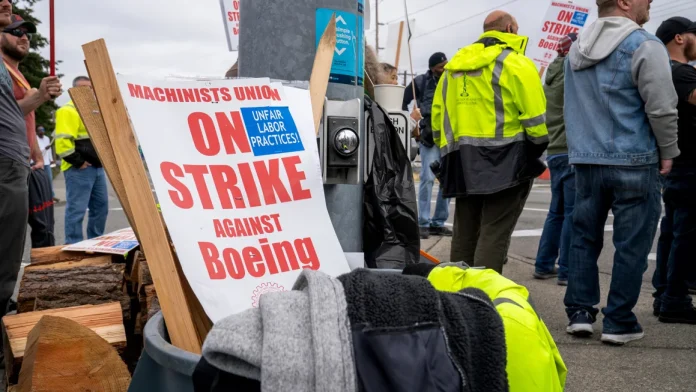Unionised Boeing workers are voting on Monday on whether to accept a contract offer or continue a strike that has lasted more than seven weeks and has halted production of most of Boeing’s passenger jets.
A vote to approve the contract would pave the way for the aerospace giant to resume production and raise the necessary funds. If members of the International Association of Mechanical and Aerospace Workers vote against Boeing’s proposal for a third time, it could put the company facing additional financial hardship and uncertainty.
In its latest proposed contract, Boeing is offering a 38% wage increase over four years, as well as approval and performance bonuses. MAM District 751, which represents Boeing workers in the Pacific Northwest, supported the offer, which is slightly more generous than what the mechanics rejected nearly a fortnight ago. The union district said in scheduling Monday’s vote:
It is time for our members to lock in these gains and confidently declare victory. We believe asking members to stay on strike longer wouldn’t be right as we have achieved so much success.
Union officials say they think they have achieved all they can through negotiations and the strike, and that if the current offer is rejected, future offers from Boeing could be worse. They plan to announce the results of the vote Monday night.
Boeing has steadfastly refused to restore traditional pensions, which the company froze nearly a decade ago. Pensions have been a key issue for workers who rejected proposals in September and October.
If mechanics approve the latest offer, they will return to work by November 12, according to the union.
Start of the Boeing workers protests
The strike began on September 13 with a decisive 94.6 percent rejection of Boeing’s offer of a 25 percent wage increase over four years – far short of the union’s original demand for a 40 percent raise over three years.
The mechanics also rejected another offer – a 35% wage increase over four years but still no pension restoration – on October 23, the same day Boeing reported a third-quarter loss of more than $6 billion. But the proposal received 36% support, up from 5% for the mid-September offer, and led Boeing executives to believe they were close to a deal.
Boeing says the average annual salary for mechanics is $75,608 and would rise to $119,309 in four years under the current offer.
In addition to a slight salary increase, the proposed contract includes a $12,000 approval bonus, up from $7,000 in the previous offer, and large company contributions to employees’ 401(k) retirement accounts.
Boeing is also promising to build its next aeroplane in the Seattle area. Union officials fear the company could revoke the promise if workers reject the new offer.
The strike has caught the attention of the Biden administration. Acting Labour Secretary Julie Su has intervened in negotiations several times, including last week.
The labour standoff is the first strike by Boeing mechanics since an eight-week strike in 2008 – the latest setback in a volatile year for the company.
Boeing has faced several federal investigations after a door plug blew off a 737 Max jet during an Alaska Airlines flight in January. Federal regulators have imposed restrictions on Boeing’s aircraft production, saying they will last until they are sure the company’s manufacturing is safe.
The door jamming incident renewed concerns about the safety of the 737 Max. The two planes crashed within less than five months of each other in 2018 and 2019, killing 346 people. The CEO, whose efforts to fix the company had failed, announced in March that he would step down. In July, Boeing agreed to plead guilty to conspiracy to defraud before regulators approved the 737 Max.
During the ongoing strike, new CEO Kelly Ortberg announced he would lay off about 17,000 employees and sell stock to prevent the company’s credit rating from being downgraded to junk. S&P and Fitch Ratings said last week that $24.3 billion in stock and other securities would cover upcoming debt payments and reduce the risk of a credit downgrade.
The strike has led to a cash shortage, depriving Boeing of money it receives when it delivers new planes to airlines. Production of the 737 Max, Boeing’s best-selling plane, and the 777, or three-hundred-seventy-seven and a cargo version of its 767 aircraft, has been halted at plants in the Seattle area.
Ortberg acknowledged that confidence in Boeing has plummeted, the company has too much debt, and serious missteps in our operations have frustrated many airlines. But he says the company’s strengths include a half-trillion-dollar aircraft order book.
